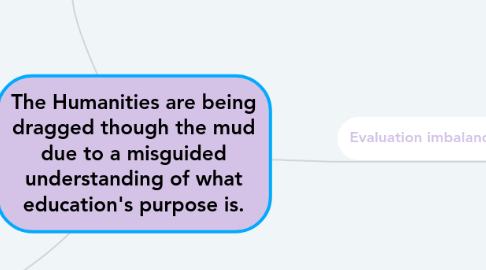The Humanities are being dragged though the mud due to a misguided understanding of what education's purpose is.
by Shayla Jablon

1. Ralph Waldo Emerson once stated "Colleges, in like manner, have their indispensable office, -- to teach elements. But they can only highly serve us, when they aim not to drill, but to create; when they gather from far every ray of various genius to their hospitable halls, and, by the concentrated fires, set the hearts of their youth on flame… Forget this, and our American colleges will recede in their public importance, whilst they grow rich every year.
2. In 1837, Emerson foreshadowed education's demise. When we begin to turn education's purpose into profitability, we fail our society while business grows rich. This is exactly what is happening. People are only concerned with earning a dollar but not in earning an understanding of the world and ourselves.
3. Education's Purpose
4. Policy-makers are at the core of education. Unfortunately they are under the impression that the purpose of education is to turn out qualified workers. However, this does not necessarily equate to productive citizens of society. Which according to Emerson, and many others in the debate is education's actual purpose.
5. Until we can get policy-makers to see the value in humanities, those in favor of the humanities will be fighting an uphill battle. We need to turn their focus from profit to skills.
6. Hidden Truths
7. Those opposing the humanities state that people with degrees in humanities do not earn as much as those in the STEM degrees. However, this isn't entirely true. Multiple sources have cited that while people with humanities degrees may not get careers as quickly, they are only earningly slightly less if not he same by the time they reach their 50/60's according to Susan Adam's report in Forbes.
8. Adams also refers to a related article in Inside Higher Ed. This article discusses the desires of employers. They are looking for an employee with skills in collaboration, problem solving, communication, and critical thinking which are all skills the humanities focus on.
9. Evaluation imbalance
10. Those opposed to the humanities often cite career success out of college has a reason the humanities do not serve a meaningful purpose. Cohan (2012) similar to Patricia Cohen, states that if a department does not turn a profit, then it should not be funded.
11. To me, this is only one side of evaluation. You can not effectively evaluate the success or significance of something based solely on one aspect, especially if that aspect if profitability.
12. Konnikova also makes a point regarding how education is evaluated. Specifically, she discusses how "softer disciplines" are not seen as equal because they are not as scientific or quantifiable.
13. Numbers is not the only way to evaluate impact. The humanities focus on people and our world in a way science does not. Science cannot answer all and that is what we have humanities for. A professor from Dartmouth sums it up perfectly, "it seems that the problems of the world boil down to me not understanding others and them not understanding me ,and that's a humanities problem" (Hertog, 2017).
14. Scott Carlson's article in The Chronicle of Higher Education also adds to this hidden truth. He states that "a quarter of the legal profession is made up of humanities majors." This hidden truth needs to be brought to the forefront of the debate. It challenges the main point of the opposing debate has against the humanities while also stressing the importance of skills that the humanities specialize in.
15. Sources
15.1. Cohan, Peter. “To boost post-college prospects, cut humanities departments”. Forbes, 2012
15.2. https://www.forbes.com/sites/petercohan/2012/05/29/to-boost-post-college-prospects-cut-humanities-departments/#53c38d8f55bf (Links to an external site.)Links to an external site.
15.3. Cohen, Patricia. “A rising call to promote STEM education and cut liberal arts funding.” The New York Times, 2016. https://www.nytimes.com/2016/02/22/business/a-rising-call-to-promote-stem-education-and-cut-liberal-arts-funding.html (Links to an external site.)Links to an external site.
15.4. Konnikova, Maria. “Humanities aren’t a science. Stop treating them like one.” Scientific American, 10 Aug. 2012 https://blogs.scientificamerican.com/literally-psyched/humanities-arent-a-science-stop-treating-them-like-one/ (Links to an external site.)Links to an external site.
15.5. Olmos-Penuela, Julia., et al. “Are Sciences Essential and Humanities Elective? Disentangling Competing Claims for Humanities Research Public Value. Arts & Humanities in Higher Education, vol. 14, no. 1, Feb. 2015, p. 61-78https://journals-sagepub-com.aurarialibrary.idm.oclc.org/doi/full/10.1177/1474022214534081?utm_source=summon&utm_medium=discovery-provider& (Links to an external site.)Links to an external site.
15.6. Hertog, Judith. “Why We Need the Humanities: Right Now More Than Ever.” Dartmouth Alumni Magazine, Mar-Apr 2017, https://dartmouthalumnimagazine.com/articles/why-we-need-humanities
15.7. Adams, Susan. “Majoring in the Humanities Does Pay Odd, Just Later.” Forbes, 22 Jan. 2014, https://www.forbes.com/sites/susanadams/2014/01/22/majoring-in-the-humanities-does-pay-off-just-later/#2c33f5e0655b
15.8. Scott Carlson. “Over Time, Humanities Grads Close the Pay Gap with Professional Peers.” The Chronicle of Higher Education, 7 Feb. 2018, https://www.chronicle.com/article/Over-Time-Humanities-Grads/242461


